
The First Epistle to the Corinthians is one of the Pauline epistles, part of the New Testament of the Christian Bible. The epistle is attributed to Paul the Apostle and a co-author, Sosthenes, and is addressed to the Christian church in Corinth. Despite the name, it is not believed to be the first such letter. Scholars believe that Sosthenes was the amanuensis who wrote down the text of the letter at Paul's direction. It addresses various issues that had arisen in the Christian community at Corinth and is composed in a form of Koine Greek.
In textual criticism of the New Testament, the Western text-type is one of the main text types. It is the predominant form of the New Testament text witnessed in the Old Latin and Syriac translations from the Greek, and also in quotations from certain 2nd and 3rd-century Christian writers, including Cyprian, Tertullian and Irenaeus. The Western text had many characteristic features, which appeared in text of the Gospels, Book of Acts, and in Pauline epistles. The Catholic epistles and the Book of Revelation probably did not have a Western form of text. It was named "Western" by Semmler (1725–1791), having originated in early centers of Christianity in the Western Roman Empire.

Philippians 2 is the second chapter of the Epistle to the Philippians in the New Testament of the Christian Bible. It is authored by Paul the Apostle about mid-50s to early 60s AD and addressed to the Christians in Philippi. Jesuit theologian Robert Murray notes that a narrative in verses 5-11 about Christ, "who humbled himself, by becoming obedient to death" is central to this chapter. German protestant theologian Ernst Lohmeyer argued in 1928 that verses 6–11 were an existing hymn about Christ which Paul quotes in his letter, a theory which "has come to dominate both exegesis of Philippians and study of early Christology and credal formulas".
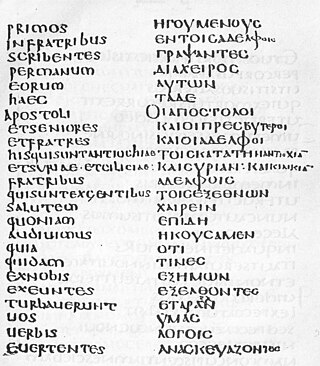
Acts 15 is the fifteenth chapter of the Acts of the Apostles in the New Testament of the Christian Bible. It records "the first great controversy in the records of the Christian Church", concerning the necessity of circumcision, Paul and Barnabas traveling to Jerusalem to attend the Council of Jerusalem and the beginning of Paul's second missionary journey. The book containing this chapter is anonymous, but early Christian tradition uniformly affirmed that Luke composed this book as well as the Gospel of Luke.

2 Corinthians 5 is the fifth chapter of the Second Epistle to the Corinthians in the New Testament of the Christian Bible. It is authored by Paul the Apostle and Timothy in Macedonia in 55–56 CE.
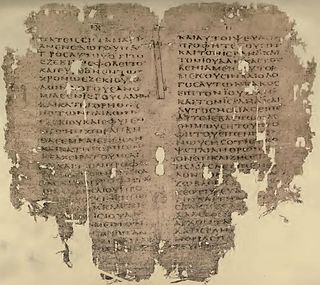
Acts 2 is the second chapter of the Acts of the Apostles in the New Testament of the Christian Bible. The book containing this chapter is anonymous but early Christian tradition asserted that Luke composed this book as well as the Gospel of Luke. This chapter records the events on the day of Pentecost, about 10 days after the ascension of Jesus Christ.
Acts 20 is the twentieth chapter of the Acts of the Apostles in the Christian New Testament of the Bible. It records the third missionary journey of Paul the Apostle. The narrator and his companions ("we") play an active part in the developments in this chapter. The book containing this chapter is anonymous, but early Christian tradition uniformly affirmed that Luke the Evangelist composed this book as well as the Gospel of Luke.
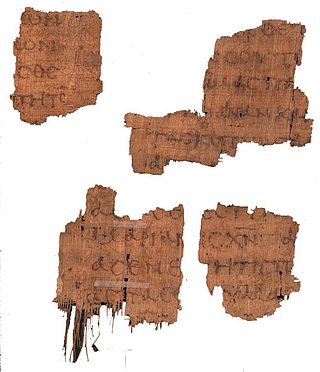
Romans 16 is the sixteenth chapter of the Epistle to the Romans in the New Testament of the Christian Bible. It is authored by Paul the Apostle, while Paul was in Corinth in the mid-50s AD, with the help of a secretary (amanuensis), Tertius, who adds his own greeting in Romans 16:22. Chapter 16 contains Paul's personal recommendation, personal greetings, final admonition, grace, greetings from companions, identification of writer/amanuensis and blessing. The chapter is divided into 27 verses.
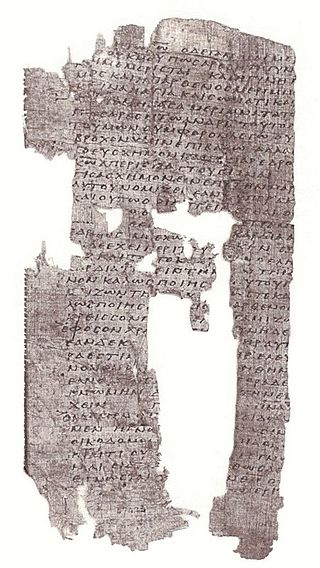
1 Corinthians 5 is the fifth chapter of the First Epistle to the Corinthians in the New Testament of the Christian Bible. It is authored by Paul the Apostle and Sosthenes in Ephesus. In this short chapter, Paul demonstrates the festivals of Christianity.

1 Corinthians 12 is the twelfth chapter of the First Epistle to the Corinthians in the New Testament of the Christian Bible. It is authored by Paul the Apostle and Sosthenes in Ephesus. In this chapter, Paul writes about spiritual gifts and the unity of the members of Christ in one body.

1 Corinthians 16 is the sixteenth and final chapter of the First Epistle to the Corinthians in the New Testament of the Christian Bible. It is authored by Paul the Apostle and Sosthenes in Ephesus, composed between 52–55 CE, and sent to the church in Corinth. This chapter contains the closing statements of the letter, with Paul's travel plans, final instructions, and greetings. Verse 8 confirms that Paul was in Ephesus when the letter was composed, and verse 21 confirms that the majority of the letter was scribed by an amanuensis.
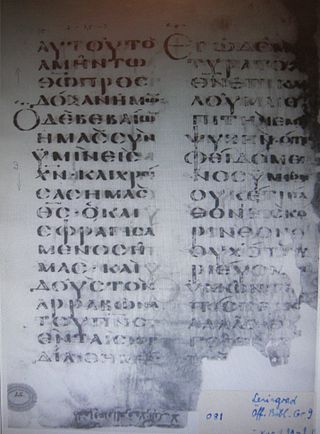
2 Corinthians 1 is the first chapter of the Second Epistle to the Corinthians in the New Testament of the Christian Bible. It is authored by Paul the Apostle and Timothy in Macedonia in 55–56 CE.

2 Corinthians 2 is the second chapter of the Second Epistle to the Corinthians in the New Testament of the Christian Bible. It is authored by Paul the Apostle and Timothy in Macedonia in 55–56 CE.

2 Corinthians 3 is the third chapter of the Second Epistle to the Corinthians in the New Testament of the Christian Bible. It is authored by Paul the Apostle and Timothy in Macedonia in 55–56 AD/CE. Biblical commentator Heinrich Meyer emphasises that the use of the plural 'we' in 2 Corinthians 3:2 and 2 Corinthians 3:6 includes Timothy in the writing of the letter.

2 Corinthians 7 is the seventh chapter of the Second Epistle to the Corinthians in the New Testament of the Christian Bible. It is authored by Paul the Apostle and Timothy in Macedonia in 55–56 CE.

2 Corinthians 12 is the twelfth chapter of the Second Epistle to the Corinthians in the New Testament of the Christian Bible. It is authored by Paul the Apostle and Timothy in Macedonia in 55–56 CE.

2 Corinthians 13 is the thirteenth and final chapter of the Second Epistle to the Corinthians in the New Testament of the Christian Bible. It is authored by Paul the Apostle and Timothy in Macedonia in 55–56 CE.

Galatians 6 is the sixth chapter of the Epistle to the Galatians in the New Testament of the Christian Bible. It is authored by Paul the Apostle for the churches in Galatia, written between 49–58 CE. This chapter contains Paul's exhortations and also a summary of the key points in the epistle.

Ephesians 4 is the fourth chapter of the Epistle to the Ephesians in the New Testament of the Christian Bible. Traditionally, it is believed to have been written by Apostle Paul while he was in prison in Rome, but more recently, it has been suggested that it was written between AD 80 and 100 by another writer using Paul's name and style. This chapter is a part of Paul's exhortation, with the particular section about the mutual interdependence of the Christians as the church and how they should live in the world (4:17–5:20).










